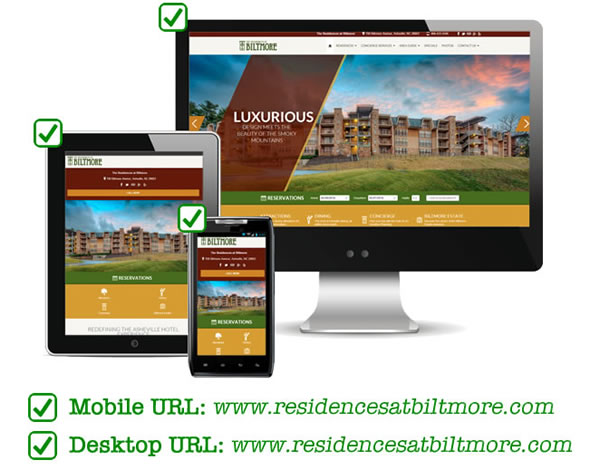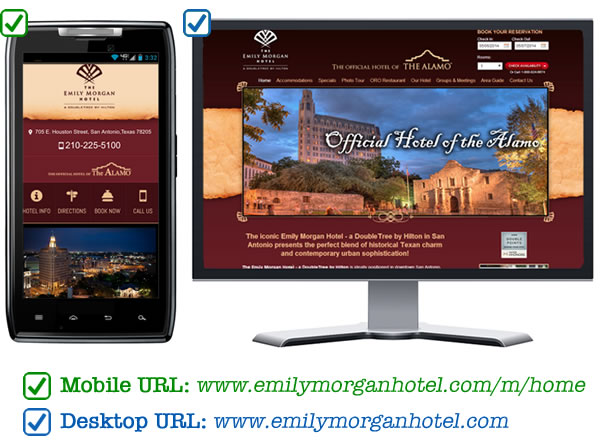There are countless blogs, articles, and presentations about the importance of mobile channels and mobile optimization for hotels, so I will not repeat that information in this article. Indeed, most hoteliers who I talk to do not need any more convincing that they need a mobile solution; instead, they are much more concerned with making sense of the overwhelming amount of mobile information and products that they encounter and ultimately choosing the right solution for their hotel. In order to assist hoteliers who are drowning in this sea of contradictory and confusing arguments, pitches, and claims; I will attempt to give a simple breakdown of the two essential forms of mobile-optimized websites – Sites that use responsive design and sites that use separate mobile URLs.
The Basics
There are two basic ideas that you need to understand in order to effectively evaluate mobile solutions and products. First, there is no single “correct” way to build a mobile website, and anyone who tells you otherwise will probably coincidentally be selling a product that uses that supposed “correct” way. Second, as with most facets of online marketing, there are countless different terms and variations that companies use to differentiate their products and impress consumers; however when you boil it down there are only two basic forms of mobile websites – responsively designed sites and sites with separate mobile pages. These two forms come in many variations and levels of quality, but, generally, both are equally viable. Here is how to spot each kind of site:
Responsive Design
At its core, responsive design simply refers to websites that, without changing the URL, rearrange or reformat pages based on how users view the site. There are many different ways that responsive design can be accomplished. It can be based on the type of device a user is browsing on (smartphone vs. desktop computer) or on the size of their screen. It can be done by adjusting the formatting of the site with css files or it can be done by sending completely different code for a single URL depending on a user’s device. Responsive design can also be called adaptive design, RESS (Responsive Design with Server Side Elements), or a number of other variations. Regardless of what it is called, if your site looks different when viewed on a mobile device than it does when viewed on a desktop computer but the URL does not change, your site uses responsive design. If the URL changes or the site looks the same, you do not have a responsively designed site.

Responsively Designed Website
Separate Mobile Pages
Websites with separate mobile pages have two or three different versions of its pages, each with different URLs, and directs users to the appropriate version based on what kind of device they are using (e.g. desktop, tablet, or mobile). If you see a URL that begins with “m.” (such as http://m.hilton.com/mt/www3.hilton.com/en/index.html) or contains “/m/” (such as www.hamptonnashvilledowntown.com/m/), you are likely on the mobile version of a site that uses separate mobile pages. Another common feature of this kind of site, is a link somewhere on the page that says something like, “Return to Full Site”, which allows you to navigate to the desktop version of the site. Responsively designed sites do not require this function because there is only one version of the site. Because of these two predominant features, it is easy to quickly identify sites that use separate mobile pages, and remember – no matter what anybody tells you, if your site has separate URLs for its mobile pages, it is not responsively designed.

Separate Mobile Site & Desktop Site
Which Method is Better?
Even if you understand the basic difference between the two methods of building mobile optimized websites, it can be hard to determine which method to use for your site. Many companies and bloggers claim that responsive design is the “correct” or “best” way to build a mobile optimized website, and indeed at Blue Magnet Interactive, we do build most of our sites with responsive design; however, as I mentioned earlier, there is no one proper way to build a mobile optimized website, and the most important thing to determine is which method will work best for your hotel, not which method is “better.”
The biggest reason that so many people claim that responsive design is the best method is that Google recommends using it; however, what they neglect to mention is that Google also fully supports sites with separate mobile pages and treats both kinds of sites identically as long as they are configured properly. One of the main reasons that Google recommends responsive design is that it is less complex to configure and manage than separate mobile pages; however sometimes the added flexibility and complexity of separate mobile sites make it a better choice for some hotels, and throughout its guidelines, Google makes it clear that responsive design is probably the right choice for most sites, not all sites.
I could go through all of the strengths and weaknesses of each method one by one, but there are already countless articles that do just that, and despite the semicolons, this article is supposed to be about simplicity. In the end although there are just the two main kinds of mobile optimized websites, the intricacies of each method can be quite complicated, so if you are looking for a mobile solution, ask prospective eCommerce partners what options they provide and what their recommendation is for your particular hotel. If they only have one option and insist that it is the “correct” or “best” method or if they claim their sites are responsive but show you examples of sites with separate mobile URLs (or vice versa), this can indicate that they either do not truly understand the complexities of mobile sites or are trying to sell you a product that might not be right for your hotel and you might want to think twice about signing up with them. Instead, look for a partner that provides clearly delineated options, can easily demonstrate the differences between the options, and can tell you which one they think is best for your hotel and why.
Related Articles:
- Hotel Website FAQ# 1: Should our hotel website be built on a proprietary CMS or an open source CMS?
- Hotel Website FAQ# 2: What should we expect from our hotel’s new vanity site?




